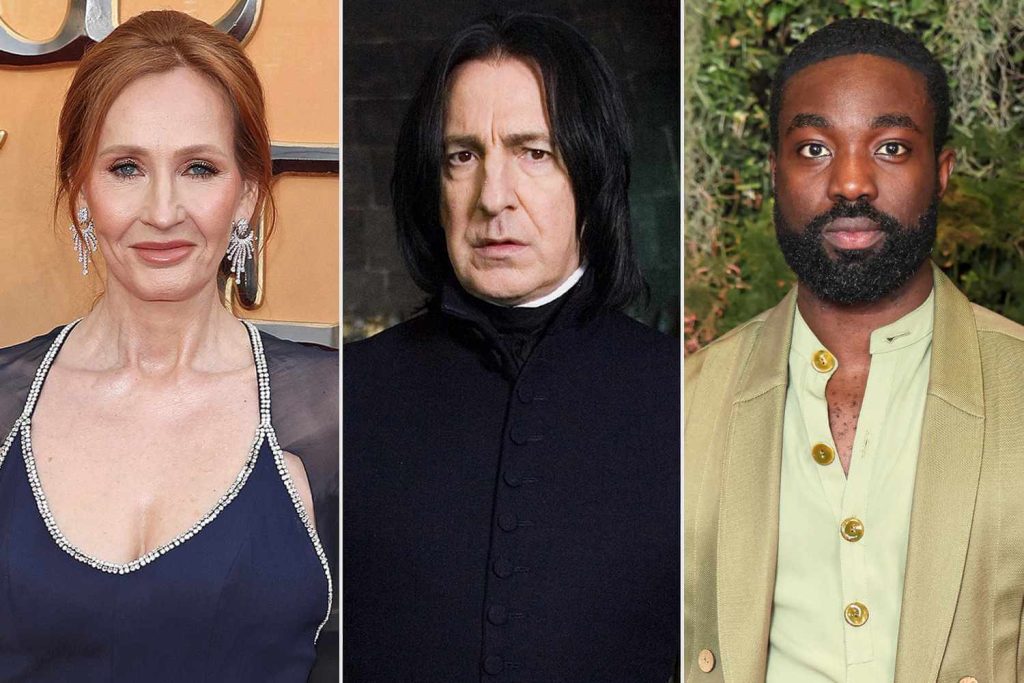World News
J.K. Rowling Responds to Paapa Essiedu’s Casting and Pro-Trans Views: Navigating Belief and Art in the Harry Potter Reboot
A New Snape for a New Era: The Casting of Paapa Essiedu
The world of Harry Potter is preparing for a major revival with the upcoming HBO television series that aims to retell J.K. Rowling’s iconic story in a long-form episodic format. Among the most talked-about casting choices is Paapa Essiedu, a British actor known for his powerful performances in productions like I May Destroy You and The Lazarus Project. Essiedu has been selected to portray the complex and morally ambiguous character of Severus Snape—a role that Alan Rickman famously made unforgettable in the original film series.
However, what could have been a straightforward celebration of diversity and fresh talent has instead stirred controversy—not because of Essiedu’s ability, which is widely respected, but because of his outspoken support for transgender rights. His progressive stance has sparked speculation about potential tension with J.K. Rowling, who has faced significant criticism in recent years for her views on gender identity and trans rights.
In a media environment that is quick to amplify conflict, the announcement quickly made headlines. Questions flooded social platforms and news sites: Would Rowling support the casting of someone who publicly opposes her ideological beliefs? Would this decision affect the production’s creative integrity or unity? As fans grappled with the implications, all eyes turned to Rowling’s response.

J.K. Rowling Breaks Her Silence: “I Don’t Fire People Over Beliefs”
The speculation surrounding Rowling’s opinion did not go unnoticed. Known for directly addressing controversies involving her name, Rowling took to social media to clarify her stance on Paapa Essiedu’s casting and the broader discussion about belief in the workplace. In a pointed post, she stated that not only does she not have the power to fire anyone from the production, but even if she did, she wouldn’t do so based on someone’s political or social views.
“I don’t believe in taking away people’s jobs or livelihoods because they hold legally protected beliefs that differ from mine,” Rowling wrote. This response, while perhaps surprising to some, aligns with her long-standing assertion that freedom of belief—whether hers or others’—should be protected in a democratic society.
Rowling’s statement was significant in several ways. First, it helped to quell rumors that she might sabotage or interfere with the series over casting decisions. Second, it demonstrated a level of professional separation between her controversial public persona and the collaborative nature of a high-profile television production. Finally, it suggested that the reboot of Harry Potter—a cultural juggernaut beloved by millions—could proceed without being overshadowed by ideological infighting.
HBO Reassures Fans: The Story Comes First
Following Rowling’s comments, HBO also stepped in to set the record straight about the creative direction of the upcoming series. Casey Bloys, the network’s content chairman, emphasized that Rowling’s views, while personal and widely publicized, would not influence the show’s narrative. “Harry Potter is not being secretly infused with anything,” Bloys said in a recent podcast interview. “We’re here to tell a great story.”
This statement aimed to assuage growing concerns among fans and critics who feared the series might be used as a platform for controversial messaging. HBO’s stance made it clear that the reboot would stay true to the source material and focus on character development, magical storytelling, and the overarching themes of courage, friendship, and resilience that have made the Harry Potter franchise so enduring.
This reassurance is especially important for audiences who may be new to the franchise or returning to it after years away. In the era of identity politics and cultural division, many viewers crave storytelling that unifies rather than polarizes. By clarifying that the series will not serve as a vehicle for ideological expression—on either side of the political spectrum—HBO positions the reboot as a narrative-centric production with the potential to reengage global audiences.

Cast Perspectives and Industry Reactions
While Rowling’s comments provided a firm response to the media speculation, reactions from the cast and entertainment industry have added more nuance to the discussion. John Lithgow, who has been cast as Albus Dumbledore in the series, shared his thoughts in a recent interview. Lithgow admitted he was “surprised” by the intensity of the backlash surrounding Rowling’s involvement but also acknowledged the importance of focusing on the creative opportunity before him.
“I was aware of the controversy,” Lithgow said, “but I felt this was a role that spoke to my heart, and I didn’t want to pass that up.” His remarks mirror those of several other cast members who see the production as a space for storytelling and artistic growth rather than a political battleground.
Paapa Essiedu, for his part, has not publicly addressed the Rowling controversy since his casting. However, his prior statements on LGBTQ+ rights and inclusivity are well documented. He has participated in campaigns promoting diversity in the arts and has spoken about the responsibility of actors and creators to uplift marginalized voices. His presence in the series sends a strong message about the evolving nature of the entertainment industry, where talent, vision, and inclusivity are becoming guiding values.
This dynamic—where individuals with differing beliefs can still collaborate—serves as an important case study in how the entertainment world might navigate ideological diversity in future projects.
The Future of Art in an Age of Division
The casting of Paapa Essiedu as Snape and Rowling’s subsequent response illustrate the ongoing tension between personal belief and professional collaboration. In an era where cultural divides often dictate public perception, Harry Potter finds itself at the crossroads of nostalgia, representation, and free speech. The reboot series—slated to bring back the magic of Hogwarts for a new generation—could become more than just a television show. It might stand as a symbol of how creative communities can embrace complexity and coexistence.
The franchise’s enduring themes—love over hate, bravery in the face of adversity, the power of unity—are perhaps more relevant today than ever before. And while J.K. Rowling’s opinions on transgender issues remain polarizing, her recent statements suggest a willingness to separate personal belief from professional practice. This, coupled with HBO’s clear editorial leadership and the diverse voices in its cast, sets the stage for a potentially powerful and healing chapter in the Harry Potter saga.
The success of the new series will likely depend not only on the quality of its production and performances but also on its ability to stay focused on what matters: the story. In that story, characters like Snape—flawed, misunderstood, yet ultimately redemptive—remind us that people are rarely just one thing. They are complex, contradictory, and capable of growth.
If the show captures that spirit, then perhaps it can transcend the noise and rediscover the magic that brought millions to Hogwarts in the first place.
From thedragonfashion


